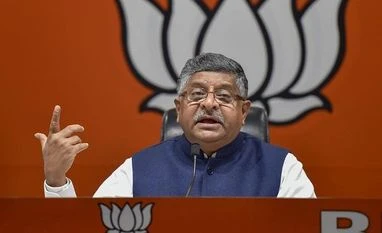Terrorists, corrupt people have no right to privacy: Ravi Shankar Prasad
Talking about gender justice, he said India is "very proud" that the Indian women are doing so well
)
FILE PHOTO: Ravi Shankar Prasad | Photo: PTI
Terrorists and corrupt people have "no right to privacy" and these people should not be allowed to abuse the internet, Union Law Minister Ravi Shankar Prasad said on Saturday.
Speaking at the inauguration of the International Judicial Conference 2020 - 'Judiciary and the Changing World', Prasad said it needs to be acknowledged that people who abuse the finest creations of humankind, one of which is the internet, pose the biggest threats.
He said the right to privacy has been held to be a fundamental right and the government appreciates that but "terrorists and the corrupt have no right to privacy because right to privacy has acquired critical proportion in the wake of digital landscape expanding globally".
"This is the age of information and information is power. This is the age of communication and communication is power," he explained.
The minister said the right to privacy verdict of the Supreme Court has become a beacon globally as it held that the right to privacy flows from Article 21 right to life and right to live with dignity.
Also Read
Prasad also warned about the "sinister trend" of some people "unleashing all forces of criticism" if courts do not deliver judgments in line with their expectations.
"In a democracy, we welcome dissent, we welcome populism. But we have a problem when populism impinges upon the well-settled constitutional principles. And populism also becomes the problem when those rejected in the popular mandate becomes the biggest flag-bearers of populism," he said.
According to the Constitution, Prasad said, it is clear that governance must be left to those elected to govern and they need to be accountable to Parliament, in many ways to judicial decisions, and to people in elections.
"But what is challenging is that populism is seeking to have a greater accountability as to what kind of judgments there should be. I am a great supporter of social media freedom. I know it is empowering but this (populism) is a dangerous trend. Judges must be left completely independent to give judgments...in accordance with the rule of law," he said.
Prasad said the "sinister trend (of populism) is developing globally" and also in India, where people have started campaigning for the kind of judgment they expect.
"If a judgment is not in accordance with them, they unleash all forces of criticism," he said, adding that the criticism of a judgment can be acceptable but criticising the judiciary is not appropriate.
Talking about gender justice, he said India is "very proud" that the Indian women are doing so well.
"You can see so many women judges sitting here of high courts and the Supreme Court, including chief justices. Our prime minister has taken a lead in empowering women in India by 'Beti Bachao, Beti Padhao'. Educate the girl child, develop the girl child," he said.
Prasad, who also holds the portfolio of the Information and Technology Ministry, said half of the four million people working in the sector are women.
"Our prime minister was bold enough to permit that women Indian Air Force pilot will also fly fighter planes and this was complimented by the recent judgment of the Supreme Court where Indian women Army officials were given the right to command. I think these are great initiatives of gender empowerment," he said.
The Union minister, however, accepted that there exists the challenges of victimisation of women and young girls but said the government has responded to address the issue by making rape laws tougher and establishing more than 1,000 fast-track courts.
"Surely this is a work in progress. We have to ensure that while we celebrate Indian women scientists joining the space programme for Mars, they should also get justice," he said.
He also talked about the money saved due to Aadhaar, opening of bank accounts and the use of technology by the government.
"Obviously, it has given rise to a lot of data and data is important. We need to keep a right balance and the balance is that we accord constitutional sanction to privacy but at the same time, we should not kill innovation. We should not kill application of new technology. Our courts have recognised that exception. India today has become the third biggest start-up ecosystem in the world," he said.
The minister said there should be a balance between rights and duties and everyone should work in a manner that the identity of India continues to remain strong and resilient.
More From This Section
Don't miss the most important news and views of the day. Get them on our Telegram channel
First Published: Feb 22 2020 | 5:20 PM IST
